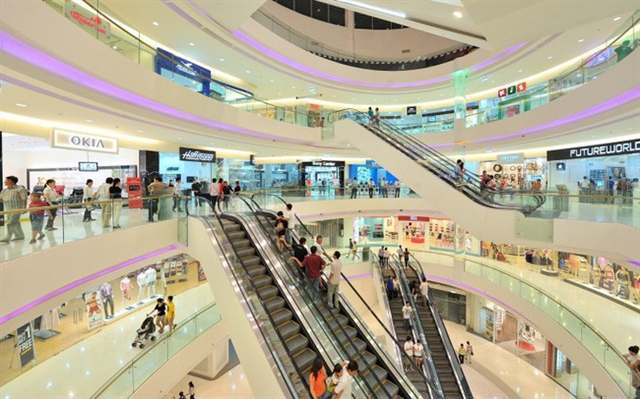 Economy
Economy

Landlords should consider shifting from their traditional fixed-rent model to a base-rent and revenue-sharing concept, experts have suggested.

|
| A shopping centre in HCM City. Experts say that landlords should shift to new rental methods to reduce risks. — VNA/VNS Photo |
HCM CITY – Landlords should consider shifting from their traditional fixed-rent model to a base-rent and revenue-sharing concept, experts have suggested.
Market researcher JLL Vietnam said in its report that although the market is expected to pick up steam again when the COVID-19 situation improves, landlords, especially domestic ones, should consider this shift.
According to JLL, the new trend would help landlords "share risks and enhance the relationship between landlords and tenants."
JLL predicted that "nearly 280,000sq.m of gross floor area of retail space is scheduled to open at end-2020. However, this remains uncertain as the weak sentiment in the traditional retail sector may affect the opening plan."
In the long term, traditional retail models in Việt Nam could restructure under this rental concept and change the tenant profile, helping to counter the current stagnation.
CBRE forecasts that by the end of 2020, international flights are expected to resume, and hence, the comeback of international tourists could occur, which could help the revenue recovery of some retailers.
"All pipeline projects have postponed their opening date, awaiting for recovery of leasing demand as well as Metro line No 1, which is expected to open next year. The opening of the first Metro line will be followed by a change in rent at projects with direct connections as well as category mix to better suit the new consumers' profile."
CBRE said that a nascent retail format, underground retail, in Việt Nam and HCM City, could become more popular thanks to the introduction of the metro lines. In the second half of 2020, the market will not have any new retail project; one project in the CBD area may reopen after two years of renovation.
The retail market of Việt Nam and of HCM City in particular, has started to show signs of recovery, albeit at a minimal level.
According to CBRE Vietnam’s survey, revenue at some food and beverage chains has recovered up to 40-70 per cent of the pre-COVID-19 level, although the level of recovery varies from location to location.
Pham Ngoc Thien Thanh, Associate Director, CBRE Vietnam, said: "Those retail areas which are heavily tourist- and office-oriented are seeing a slower recovery as the economic downturn has had such a great impact on consumers’ purchasing power and tightened their spending budget. In the second half of 2020, consumers will still focus on foods, essential goods, and healthcare products, instead of discretionary goods."
The company said that, along with store consolidation and size reductions, are stores' serious investments in an online retail and omni-channel strategy.
In Việt Nam, some brands have introduced online platforms such as Starbucks, Maison and soon, ACFC. Some mid-end F&B and coffee brands such as Pizza4Ps and Ong Bau Coffee have become more creative and introduced kiosks and semi-truck formats to quickly expand their market coverage. On the other hand, some local brands wanted to utilise this low market cycle to accelerate their expansion strategy and boost their competitive capacity in the near future.
Sharing the view, JLL said weak sentiment during the COVID-19 pandemic has led to an increase in vacancy at malls in HCM City.
“After this period, most of the malls started to re-operate, but with more vacant space, especially those shopping malls in city fringe districts as weak leasing demand continued. The vacancy rate in HCM City shopping malls increased to 30 per cent in second quarter.”
Large-scale tenants including game and entertainment, spa and wellness shops were struggling to maintain footfall as the end-users tended to cut their budget for those kinds of merchandise and activities, and thus shops were forced to compress their occupied space.
Meanwhile, food and beverage retailers in HCM City seemed more resilient, especially after the partial lockdown, recording a solid increase in leasing inquiries in the second quarter.
A short and partial lockdown period in Việt Nam has not changed the dining out habit in the market. Since social distancing was lifted, strong footfall has gradually returned in many restaurants across the city. — VNS




